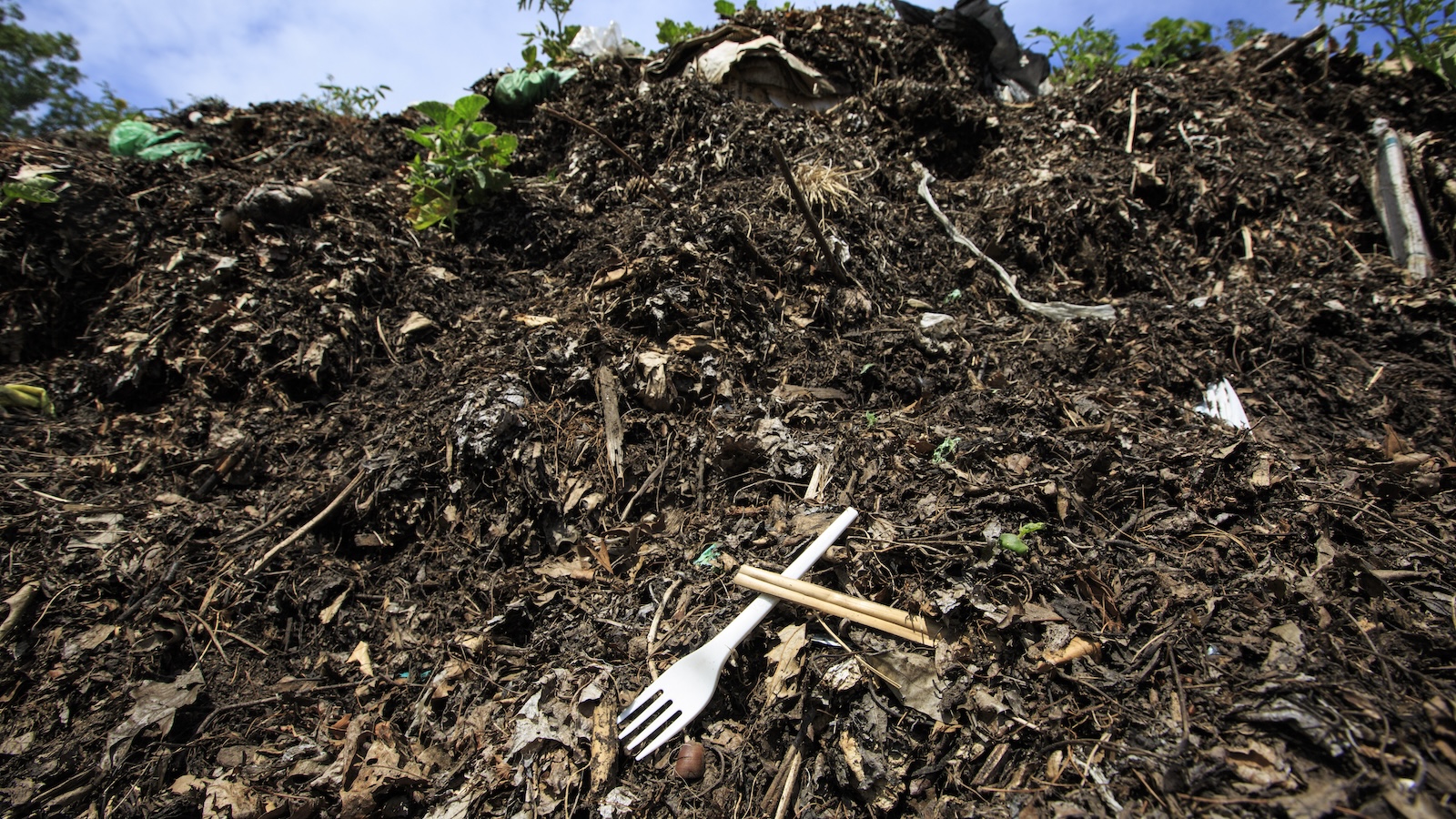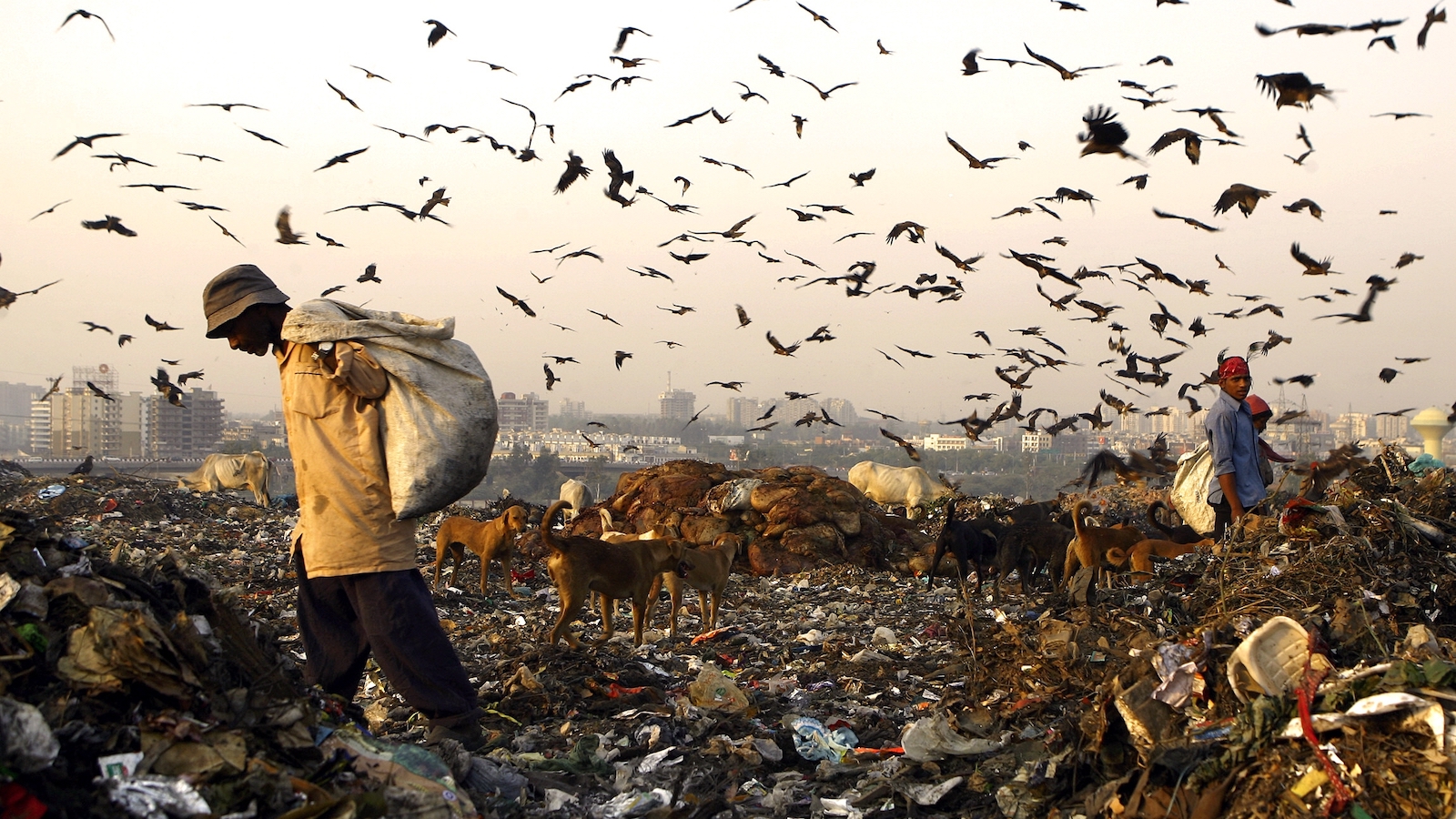When A1 Organics announced last year that it would stop accepting pizza boxes, cutlery, and other certified-compostable foodware from the residents of Denver, some took to Reddit to express their discontent.
“Damn,” one user wrote. “I was looking forward to occasionally composting plates.”
But what really disconcerted others was the reason Colorado’s largest composter — then contracted to manage Denver’s organic waste — decided to make the switch. According to a notice A1 published in February 2023, 10 percent of the material it was getting was deemed “too contaminated to process effectively.” In other words, it was littered with regular old plastic trash — bags, cutlery, and packaging, some of which may have resembled their certified-compostable lookalikes, but weren’t. All that junk was jeopardizing the quality of A1’s finished compost.
“Contamination is the number one challenge our industry faces in the residential and commercial organics recycling stream,” A1’s press release read. As of April 1 of last year, the company said it would only collect people’s food waste and yard trimmings, plus one very specific type of certified-compostable, 3-gallon bag used to collect food scraps.
The kerfuffle pointed to a much broader confusion around consumer products made from bioplastics — an umbrella term for products that are supposedly biodegradable, made partly or entirely from plant materials, or both. These products tend to look similar to those made from conventional fossil fuel-based plastics, except they’re tinted green, marked with a leaf, or labeled using words like “biodegradable,” “oxo-degradable,” or “compostable.”
One problem is that those labels don’t mean much; the United States has no enforceable guidelines around “degradability” claims, and the word “compostable” is only valid if backed by verification from a third party. Even then, certified-compostable products may only break down in certain facilities operating under specific conditions.
The other problem is that, by saying they’ll accept certified-compostable products, composters open themselves up to a potential flood of contamination from noncertified plastic lookalikes. Sometimes even the most discerning customers can’t tell the difference between products that are compostable and those that are not. Other times, the contamination is a result of carelessness.
A1 was by no means the first composter to confront these challenges. Nor was it the first in the U.S. to react by moving away from compostable consumer goods altogether. In 2021, Vermont’s biggest composter said it would no longer accept compostable packaging due to high contamination rates from noncompostable plastics. The same thing happened in 2019 with one of Oregon’s largest composters.
Since then, several states — including California, Colorado, Maryland, Minnesota, and Washington — have attempted to solve the problem through “truth-in-labeling” laws that clarify what products are and aren’t compostable. Colorado’s law, considered by one environmental group to be the nation’s “most comprehensive,” went into full effect last month. It says compostable products have to be certified by a third party and labeled in specific ways — for example, with the word “compostable” and with green-colored stripes or other marks. Products that are not certified compostable are forbidden from using similar labeling schemes, including the color green and words like “natural,” “biodegradable,” “decomposable,” “oxo-degradable,” or any other phrases that imply decomposition.

Many advocates are hopeful that these laws will stop or reverse the trend of composters restricting their lists of accepted materials.
Julie Mach, owner of a small Salido, Colorado-based compost company called Elements Mountain Compost, said she’s particularly eager to see better labeling of compostable bags. “There’s been a lot of greenwashing” around these products, she told Grist — “on Amazon, online, wherever you’re going to buy them.” Her company does take compostable consumer goods. She said she worked at one event where volunteers mistakenly collected food scraps in noncompostable plastic garbage bags, just because they were tinted green. Mach didn’t find out until three days had gone by, after she had already incorporated the bags into her compost.
“I was pulling them out of my pile a year later,” she said.
At the same time, however, environmental groups and even composters themselves are questioning whether it’s enough to simply get rid of plastic contaminants. Some say it’s the sheer volume of bioplastics that’s the problem — compost facilities were never designed to process this kind of waste in such great quantities. They say policymakers should not only address misleading marketing claims around compostable products, but also reduce the need for so much single-use packaging and serviceware in the first place, compostable or not.
Truth-in-labeling laws “will certainly make it easier in some cases to move forward,” said Danny Katz, executive director of the nonprofit Colorado Public Interest Research Group. But he said it’s important that compost advocates remember other waste mitigation strategies too, including reusable cups, containers, and cutlery. “We need to continue to remind everyone that we have to emphasize reusables first and foremost.”
To understand composters’ perspectives, it’s important to understand one of the main motivations behind curbside composting: diverting food waste for the sake of the climate. Keeping food waste out of landfills prevents it from emitting methane, a greenhouse gas that’s 84 times more powerful than carbon dioxide during its first 20 years in the atmosphere. According to one estimate from the nonprofit Global Alliance for Incinerator Alternatives, separating and composting organic waste could help the world’s cities reduce methane emissions from landfills by nearly two-thirds.
Compostable packaging and foodware only advances this goal when it redirects food scraps that would otherwise have gone to the landfill; bioplastics themselves are considered “collateral damage” that do not contribute valuable nutrients. Several composters Grist spoke with said that’s what they first thought these products would do — those thin green bags, for instance, could make composting more palatable to people who might otherwise not like to clean the mold out of their kitchen bins, or carry the bins outside to their big curbside containers.
Over time, however, they found that people had begun to see compostable dishes, cups, cutlery, and other products as one-to-one replacements for single-use plastics. And they were asking composting facilities to deal with the resulting waste.
“We’re now seeing a transition from food waste composting to the treatment of compostable products,” Bob Yost, A1’s former vice president and CTO, said during a virtual roundtable in March.
This is a problem because compostable packaging doesn’t make good compost; food waste does. And so the risk of scaling up the acceptance of compostable packaging and foodware — even if the fossil fuel-based plastic is filtered out — is that it will incentivize using the stuff in ever-increasing quantities, instead of switching to less resource-intensive options like reusables. Jeff West, owner of the Port Orchard, Washington-based composter NextGen Organics, said during the virtual roundtable that the single-use compostables he gets typically outweigh the amount of food waste people send him.
“The solution isn’t just more single-use items,” Clinton Sander, A1 Organics’ marketing manager, told Grist. Other experts have raised concerns about toxic chemicals used in compostable products, or incomplete degradation of supposedly compostable materials. All of these factors can compromise the finished compost’s sale price because of a perceived drop in its quality.
In the absence of a systematic, society-wide shift away from single-use products, many composters are hopeful that at least the truth-in-labeling laws will prevent contamination from hurting their bottom line — and public health. According to a report released earlier this year by the U.S. Composting Council, an industry group, composters spend about 20 percent of their operating costs on contamination. But if plastic isn’t removed from compost, it can break down into smaller fragments known as microplastics that can be harmful to humans. Some research suggests that chemicals released by microplastic can harm crops’ cells and genes, and the microplastics themselves can adsorb onto crop seeds and roots, inhibiting the uptake of water and nutrients.
Sander said Colorado’s truth-in-labeling requirements are a “step in the right direction,” and that he could imagine at some point reintroducing compostables on a product-by-product basis. Mach said she’s already seen some companies change their product offerings — like one that used to offer compostable cutlery in a number of colors, but now only sells them in bright green.
Denver replaced A1 Organics with a new composter, Waste Management, as a result of a bidding process several months ago. Waste Management hasn’t announced any plans to begin accepting Denver’s compostable products and did not respond to Grist’s request to be interviewed for this article, but a spokesperson for the city of Denver said she’s hopeful that the law will encourage more of the region’s processors to accept compostable packaging.





